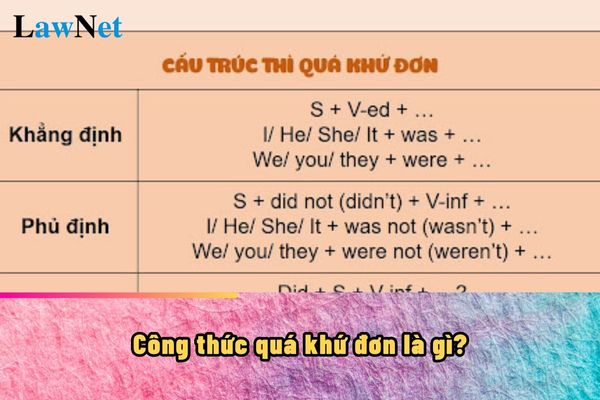What is the structure of the Simple Past Tense? Is English a mandatory subject in Vietnam?
What is the structure of the Simple Past Tense?
The structure of the Simple Past Tense is the knowledge in the English subject.
Students can refer to the following:
|
Structure of the Simple Past Tense The simple past tense is used to describe an action that happened and was completed in the past, with no relation to the present. Affirmative: S + V2/ed + O S: Subject Negative: S + did + not + V (base form) did not = didn't Question: Did + S + V (base form)? *Example: Yesterday: I bought a new book yesterday. |
Note: Information about the structure of the Simple Past Tense is for reference only./.

What is the structure of the Simple Past Tense? Is English a mandatory subject in Vietnam? (Image from the Internet)
Is English a mandatory subject in Vietnam?
In Section 1 of the English Language Education Program issued under Circular 32/2018/TT-BGDDT:
CHARACTERISTICS OF THE SUBJECT
English is a compulsory subject in the general education program from grade 3 to grade 12. As one of the instrumental subjects in general education, English not only helps students form and develop communication skills in English but also contributes to the formation and development of general competencies to live and work more effectively, to learn well in other subjects, and to engage in lifelong learning.
...
Thus, according to the regulations above, English is a mandatory subject in the general education program from grade 3 to grade 12.
What are the specific competency requirements for primary students after learning English?
According to Section 4 of the English Language Education Program issued under Circular 32/2018/TT-BGDDT, the specific competency requirements for primary students after learning English are as follows:
- After completing the English subject at the primary level, students can reach Level 1 in English language proficiency according to the 6-level Foreign Language Competence Framework for Vietnam.
To be specific: “Can understand and use familiar everyday expressions and basic phrases for specific needs. Can introduce themselves and others; can answer questions about personal details such as where they live, people they know, etc. Can communicate simply if the interlocutor speaks slowly, clearly, and is willing to help.”
- Through English, students gain initial insights into the countries, people, and cultures of some English-speaking countries and other nations around the world; they develop a positive attitude towards learning English; they feel pride, love, and respect for their own language and culture; they develop qualities like kindness, self-respect, respect for friends, family, the environment, diligence, and honesty.

